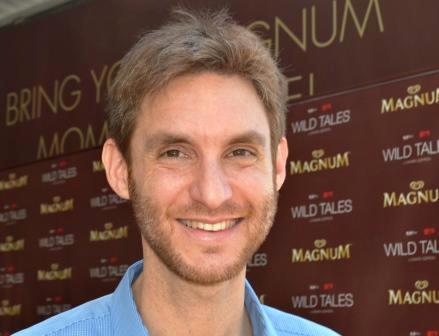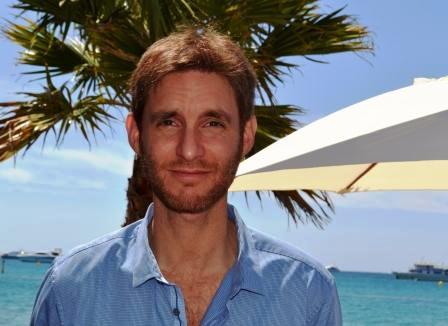It was one of the rare films in the Cannes competition that inspired the audience to clap spontaneously after the sequences -- and kept them laughing uproariously throughout: Argentinean Damián Szifron's Wild Tales, produced by Almodovar brothers Pedro and Agustin. This black comedy is composed of six sketches, each delving into the issue of injustice and revenge as experienced in our contemporary world. What makes it so entertaining is the brilliance of the creative gags: each sketch surprises in zany ways, from the parking ticket that leads to prison to the wedding that leads to sex with a stranger on a rooftop. In fact, I was surprised this film did not receive some kind of prize at Cannes. At the same time that it is hilarious, the film is a trenchant critique, not only of oppression, but of what happens when human beings feel frustrated and give in to their impulse for rage. It is, in effect, a study of why---to quote one line--"violence is all around us." And Gustavo Santaolalla's superb soundtrack, accompanying the twists in the plot, gives the film a contemporary, fresh feel.
The film opens with the ultra-loud rumble of a rolling blue suitcase and the accompanying clicking heels of a beautiful woman (played by the director's wife) approaching a counter in an airport to check in: a comic violent sound that immediately alerts us to the vivacious energy this film will have. On the plane, a music critic flirts with this young woman, a fashion model, as she settles into her seat. Lest we think this will be a romantic comedy, within seconds the dialogue twists into a bizarre direction.... and the story quickly turns into revenge: the revenge of the rejected outcast, who has suffered from kindergarten to his psychiatrist's couch.
Revenge is also at stake in the next sketch which takes place in a highway diner, with just (at first) three characters: a young waitress, an obese ex-con female chef (played marvelously by Rita Cortes), and a mafioso loan-shark who comes in to eat some eggs and French fries. Soon we learn that this loan-shark was responsible for the loss of the girl's family home -- and her father's subsequent suicide.
"I want to insult him!" the waitress cries in the kitchen.
"Insult!" The ex-con chef winks: "You want to insult this guy? Insulting is not enough! Bastards rule the world! Haven't you realized this? Are you going to be like everyone else and just lament and not lift a finger?"
Soon there is more blood than ketchup in this restaurant.
Szifron's forte, in all the sketches, is not being afraid to push the story to its extreme. Each story starts with one banal element -- a cake, a car, a suitcase, a wedding gown -- and soon we learn to suspect that something drastic will happen to that object. Anger will enflame more anger. In the third sketch, for example, a wealthy arrogant man driving an Audi gives the finger to the driver of a dumpy old wreck who has cut him off. What ensues is a study in how many parts of a car can potentially kill: a seatbelt, a tire, a fire extinguisher, a gas tank...
And in the final sketch -- the most over-the-top -- a betrayed bride on her wedding night turns the tables, until the entire wedding becomes an acrobatic act of flying cake, shattered glass, murderous dancing and unexpected sex. The audience was clapping and cheering throughout.
But my own favorite episode: the one that cruelly exposes the class structure in Argentina, where the rich can easily "pay off" the poor to take responsibility for their crimes. The rich father of a drunken kid who drives into and kills a pregnant woman (a hit and run) gets the family chauffeur to say he was driving the car.
"It is very Latin America," nodded a Venezuelan journalist next to me.
Yes. Indeed, not only this sketch, but all six point to the infuriating inequities in the director's homeland. But the reason the film touches us so deeply is that we can all relate to injustice, especially the mundane kind highlighted in this film. Szifron, a TV (and film) director, with a hit series under his belt in Buenos Aires, is a master at taking an average setting -- a plane, a diner, a wedding hall, a parking lot -- and turning this innocent locale into a stage for horror. The point is that in real life, the potential for violence and hatred lurks in our everyday encounters.
I met with Damien Szifron on the Magnum Beach here in Cannes to discuss.
How do you get your creative ideas?
I have flashes in the middle of the night; images that I find powerful. I see a conflict in the image already: the image in fact includes the ending. Just like in Jaws, when the shark bites the girl, the ending is already there. So when the guy is driving his Audi on the highway, and has a discussion with the other driver, then has a flat tire, you know it's going to end up badly. I saw the skulls already. [When I write from an image], it is like when you have a dream and you try to remember it, and miss a lot of things, then find it again.
Why this interest in revenge?
I am interested in rebellion against the system: the pleasure you feel when you identify with someone who responds to what oppresses him or her in daily situations. My film critiques the capitalist system of the Western world. When a society oppresses its citizens, our human nature, our feelings, our desires are distorted. I think we are all living with an invisible roof over our heads; even when we make a good living, you have desires in your head for what someone else has. You always have less than what you want. It seems natural to try to improve yourself by getting more money, instead of searching for what gives you pleasure in a more direct way: instead of doing what it is you love. If we followed our pleasures directly, the world would be extremely better. But we think we are going to get pleasure by getting more money, even if we are smart -- this world has become commercial.
How is your film specifically about power corruption in Argentina?
Yes, injustice is seen more in Argentina, but the system is much bigger than Argentina, which happens to be one of the poorest countries of the first world. It's all connected. First world materials are made in third world countries. As for an alternative to this capitalist system: I don't think any socialist system works yet. It did not solve a lot of problems. But I find the basis of socialism more noble than capitalism.
How did you first get interested in cinema?
My father was very poor, a refugee from Poland who came during the second World War. My grandparents came from Poland. Since I was an infant, my father took me to the movies. He did well in business; he got some money and began to buy cameras; he used to add film music to our family movies. It is from my father that I first got my love of movies.


